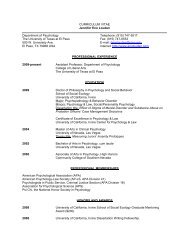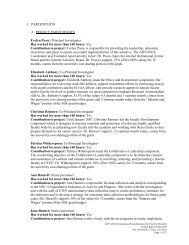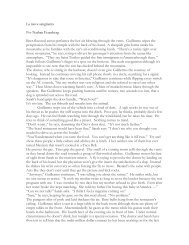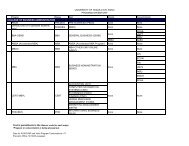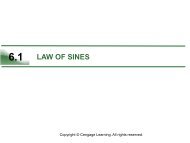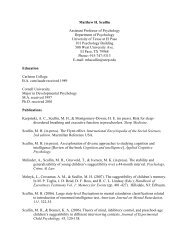You also want an ePaper? Increase the reach of your titles
YUMPU automatically turns print PDFs into web optimized ePapers that Google loves.
IN THE WORDS OF THE DESIGNERS WHO PARTICIPATED IN UP AGAINST THE WALL: POSTERS OF SOCIAL PROTEST<br />
IN THE WORDS OF<br />
Resides in Long Island City, New York<br />
QUESTION: Do you think of yourself as an illustrator who designs,<br />
or as a designer who illustrates, or as an artist who does both? I’ve<br />
always been an artist and my biggest priority is the content of my work.<br />
Type and image are just two components of the form and they are very<br />
important, but I try to experiment with other media like 3-d installations<br />
and animation. What unites all my work is the ideas and meaning I put<br />
into it, not so much the formal execution.<br />
QUESTION: Lettering and typography play an important role in much<br />
of your work. At what point in the design process does the type or<br />
lettering treatment come into play. Or does it depend on the project? The<br />
use of type definitely depends on the project. Actually, I think that my<br />
forte is the image that needs no words. But when I have to use type I do<br />
it with a great respect for the craft because bad type can spoil even the<br />
greatest idea. I love hand lettering and I find its imperfections appropriate<br />
for my theatre work because handmade type reflects the humanity and<br />
spontaneity of a theatre performance. I approach type as an inseparable<br />
part of the image and I always look for an organic connection of these<br />
elements.<br />
QUESTION: In 2008, you created series of posters that focused on issues<br />
of social justice. In fact, that was the title of the series. Several of these<br />
are included in Up Against the Wall, and one of these, Health Coverage,<br />
was included in an exhibit celebrating President Obama’s inauguration.<br />
This single issue has been among the most contentious of the new<br />
administration. Do you find it frustrating that issues as important as<br />
this one seem so difficult to resolve? The Social Justice portfolio was<br />
the first title of my publishing company Clay & Gold. I’m very happy that<br />
these images reached both ordinary people and politicians. I’ve received<br />
fan letters from 80-year-olds to high school students. The biggest honor<br />
came when I was approached by the people of the Obama’s campaign<br />
and they wanted a huge print of the Health Coverage poster for the art<br />
exhibit at the inauguration. A governmental agency purchased the print<br />
at the show and I was sure back then that the health care issue will be<br />
resolved in the first months of Obama’s presidency. Unfortunately, my<br />
poster is still relevant and it is so frustrating to see how the greed of the<br />
insurance companies prevails over the sufferings of so many Americans<br />
who can not afford health care.<br />
QUESTION: A related question: do you find it ironic that many people<br />
who would benefit the most from health care reform seem to be among<br />
the most vociferously opposed? Well, this is an absurd situation. You<br />
are talking about the Tea Party, right? I can understand and identify with<br />
the disappointment that many ordinary people feel. It’s difficult to trust<br />
a government who bails out the big banks and lets thousands lose their<br />
jobs and homes. But the media is also to blame for not exposing the
truth. I think I covered that with my Brainwashing poster. It’s easy to<br />
manipulate angry jobless people. I still hope the reason will prevail. In<br />
any case, I think it is exciting to be an artist today. There are so many<br />
themes to tackle.<br />
QUESTION: Your poster addresses the problem in a very clear and<br />
commanding way, so, speaking as a designer, what can the design<br />
community do to get the message across? Not just on this issue, but<br />
on many issues of social justice? Just do it! Speak out! Find ways to<br />
reach real people, not just get published in design annuals and collect<br />
certificates of excellence. Design with meaning is really needed in the<br />
world and it is our responsibility to offer it to the community.<br />
QUESTION: Edmund Burke said, “All that is necessary for evil to triumph<br />
is for good men to do nothing.” Do designers have a special responsibility,<br />
perhaps because of their communication skills, to address social issues?<br />
Exactly! That's how I feel. I don’t need a client to commission me to<br />
do what I have to do. I can share one thing with you: enthusiasm is<br />
contagious. There are many people who will support us if there is integrity<br />
and passion in our work.<br />
QUESTION: History teaches us that graphic design can produce results<br />
that are not always healthy for society. Someone designed all those<br />
cigarette packages, after all. And as Steven Heller has frequently pointed<br />
out, Hitler had a pretty good design team working for him. Designers<br />
often must wrestle with their consciences before accepting a project.<br />
Have you ever had to turn down a project because you found the subject<br />
matter offensive? If so, can you discuss examples, (perhaps without<br />
being specific)? Here I can give additional historical examples. I grew<br />
up during communism in Bulgaria. Communism in Europe lasted much<br />
longer than Fascism and I’ve experienced many of its terrible atrocities.<br />
I was a very young artist back then but I knew that if I had compromised<br />
my beliefs I would have gotten a better treatment by the regime. Living<br />
in the land of freedom for 20 years hasn’t changed me much in that<br />
direction. I’ve been approached several times by clients who wanted to<br />
use my work for causes I disagree with. Of course I’ve refused to do it.<br />
The good thing is that they didn’t send me to a gulag for not cooperating.<br />
Just kidding!<br />
QUESTION: Many of the participants in Up Against the Wall are from<br />
outside the United States, and several, such as yourself, now live and<br />
work here. Do you feel this provides an insight into social problems that<br />
native-born designers may lack? Does a European background provide<br />
a better opinion of American values, or a different one? Are we justified<br />
in thinking of the American experience as exceptional, as separate from<br />
what we call the “old world”? I would disagree on this one. I know many<br />
Americans who have the same sensitivity to social issues just like me. I<br />
think this period of economic struggle is also a time for awakening for<br />
many people and it will produce a much more vigorous art and design.<br />
I do believe that the American experience is exceptional, though. There<br />
is no other place on earth where people can face so openly the societal<br />
problems and express their opinions without fear of persecution.<br />
QUESTION: Like many of the other participants in this exhibit, you also<br />
teach. How long have you been teaching, and where? Does teaching<br />
inform your role as a designer? Do you find that teaching is also a<br />
learning experience? Does working with students inspire a special<br />
energy or inspiration that you may not have otherwise encountered?<br />
What advice do you have for students interested in illustration and<br />
design? Also, is it important to nurture in your students a sense of<br />
social responsibility, or does that violate the separation of pedagogy and<br />
propaganda? I teach just one senior design class at Pratt Institute in New<br />
York, since 2007. I’m also invited often for lectures and workshops in the<br />
US and internationally. I enjoy this exchange with the younger generation<br />
and I’m happy to share my experience. In all of my assignments I try<br />
to trigger that sense of social responsibility. I think propaganda has<br />
nothing to do with what I teach or practice. I always push for a profound<br />
understanding of the issues and expressing a personal opinion on them.<br />
QUESTION: What is next for <strong>Luba</strong> <strong>Lukova</strong>, (do you have any pending<br />
projects you would like to discuss)? Is there anything else you would<br />
like to add? Look for my new book Graphic Guts. This is a comprehensive<br />
collection of my political posters.



